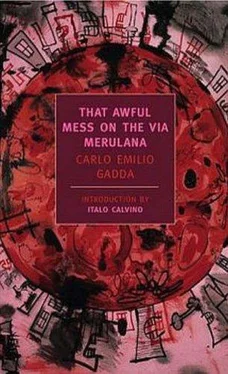Carlo Gadda - That Awful Mess on the via Merulana
Здесь есть возможность читать онлайн «Carlo Gadda - That Awful Mess on the via Merulana» весь текст электронной книги совершенно бесплатно (целиком полную версию без сокращений). В некоторых случаях можно слушать аудио, скачать через торрент в формате fb2 и присутствует краткое содержание. Год выпуска: 2007, Издательство: NYRB Classics, Жанр: Современная проза, на английском языке. Описание произведения, (предисловие) а так же отзывы посетителей доступны на портале библиотеки ЛибКат.
- Название:That Awful Mess on the via Merulana
- Автор:
- Издательство:NYRB Classics
- Жанр:
- Год:2007
- ISBN:нет данных
- Рейтинг книги:5 / 5. Голосов: 1
-
Избранное:Добавить в избранное
- Отзывы:
-
Ваша оценка:
- 100
- 1
- 2
- 3
- 4
- 5
That Awful Mess on the via Merulana: краткое содержание, описание и аннотация
Предлагаем к чтению аннотацию, описание, краткое содержание или предисловие (зависит от того, что написал сам автор книги «That Awful Mess on the via Merulana»). Если вы не нашли необходимую информацию о книге — напишите в комментариях, мы постараемся отыскать её.
Italo Calvino, Pier Paolo Pasolini, and Alberto Moravia all considered
to be the great modern Italian novel. Unquestionably, it is a work of universal significance and protean genius: a rich social novel, a comic opera, an act of political resistance, a blazing feat of baroque wordplay, and a haunting story of life and death.
That Awful Mess on the via Merulana — читать онлайн бесплатно полную книгу (весь текст) целиком
Ниже представлен текст книги, разбитый по страницам. Система сохранения места последней прочитанной страницы, позволяет с удобством читать онлайн бесплатно книгу «That Awful Mess on the via Merulana», без необходимости каждый раз заново искать на чём Вы остановились. Поставьте закладку, и сможете в любой момент перейти на страницу, на которой закончили чтение.
Интервал:
Закладка:
"That shit who's warming my thigh now."
Oh, Iginio. The carabinieri had caught hold of him by the scarf, but he, quick as a wink, had already slipped from their hands. That lousy pistol of his, he never dreamed of shooting it, but just kept it to defend himself: and now, as if the rest weren't enough, he had hidden it, buried it. Thank God. But now it's not buried any more. Some gun! Good enough to scare the countess. The cap? Ha! He had it in the pocket of that sack thing he was wearing. The law, no, they couldn't put him in jail three years because of a green scarf and a cap, and an old pistol, all rusty and useless. The knife. . Madonna Santa! he had been wrong to use it, on a married lady… in her house, if it was true that he was the one who did it. And a chill sweat, a shudder of revulsion and anguish now gripped her again at the thought: it was horrible. And she dried her cheeks, her eyes with a filthy rag. The fat sergeant from Marino — and she wiped her little nose — how had he figured it out? How had he guessed everything?
Because of the scarf, all right: but that scarf can't speak. And the ring with the yellow stone, how had he learned that it had been Igi who gave it to her? All of a sudden? And that she and Igi had exchanged their promises three days before, after almost a year that they had been going together, so that the ring… he had been the one to stick it on her finger, forcing it on her? "The ring's mine, isn't it? And you're my girl, aren't you" he had said, and had kissed her with a fury!… it was enough to scare you, almost. But the corporal, though, how had he managed to guess? Ah! Could he of been hiding behind a tree, behind a bush, right there, when they had said yes to each other? Or had somebody else seen them and told him about it? Had Igi gone around telling about it, the way men brag? (and her heart leapt with pride). Well, it wasn't too good for him to talk, either. And besides he wasn't the kind who likes to do much talking. You couldn't get much more than an um or an uh out of that mouth of his, that mean-face. Well who? Some girl from Zamira's? There were three of them now, sewing there: she herself went almost every day: Camilla and Clelia, maybe every other day. Camilla hadn't opened her mouth, for sure, with her dirty conscience at having taken the goods, all that gold and those stones: sooner than talk she'd do better to jump in front of the train. Clelia? Clelia liked those big carabinieri: to her they seemed like so many handsome devils, she could dance with them all and say yes to one every month, that was obvious: even a blind man could see it. But to turn informer to the soldiers and tell on a girl friend, a fellow worker! "Or maybe it's another lousy lie of that corporal's," and she glanced at Pestalozzi who was struggling upon his musical bike, "that lousy northerner, who wants to make sergeant no matter what? No: it would never pop into Clelia's head to inform on anybody. She walked her legs off to get a bowl of soup at night, and a cot, all the way to Santa Rita in Vitacolo: she was too far away, and in a place that was too open. It was already dark when she got home. And besides what? She'd be risking something herself. If Igi — just supposing — if Igi happened to find out, that she had talked! He wasn't above breaking her bones for her." And she recalled in a kind of somnolence barely illuminated by flashes, in a leap of her blood, in the hammering of the blood in her ears, she remembered that the sergeant's bike, the fat sergeant's, they heard it spluttering a little all along every road and path, raging at the closed crossing, annoyed, as far as Torraccio, Ponte, as far as Santa Palomba, where the radio poles are, and sometimes yes, even as far as Santa Rita in Vitacolo.
But what did that mean? It was his job, running around on his motorcycle day and night, to go and visit his poor, to see how they were getting along… his chickens: that's why he wore those double chevrons of silver. "That's all he can think about, tearing around the day and night with his bike, you might say: and when he's done, he goes to bed: he plays the radio: and he has seven women who listen to it, besides himself."
Spies were not lacking, certainly, closed in the torpor of her mind and senses, from which Santa Rita had already evaporated. The sergeant, from confidences gathered the day before, had, according to her, succeeded in extracting (now she dreamt) how one Retalli Enea alias Iginio had become engaged to the beautiful Lavinia from whom with his infinite promises and a face that made you scared, he had obtained some advances. "Advances?" "Yes, some paper," answered the spy, without a face but with every certainty of the feminine sex, since she wore a shawl and skirt, "and especially. . don't make me come out and say these things, Sergeant, you know what I mean better than I do." The ring — it had been he, Retalli Enea, who had given it to this beautiful Lavinia in a strange moment, as if he were going away: clasping her to him, kissing her furiously on the mouth, on the eyes. Or perhaps, that faceless apparition went on to say, and exhaling a word not human, to be rid of a trinket that was too risky to carry on his person, in those circumstances, and with the intention of collecting again one day, when he could move more freely. "But where were you when you saw them?"
"I saw them," answered the phantom of the lonely road, "I saw them from that pink house where you come up from Torraccio, where I go and do some odd jobs every now and then." "But if you were inside the house, and they. . they were about their business outside, on a path. No, it doesn't work out right." "Sergeant, I saw them from the window." "From what window?" "From the window of the toilet": and Lavinia's mind was lost: real images become deformed, filtered through a tired, yet clairvoyant drowsiness. "You should go and look. It's a toilet, where you can see everything: motorcycles, the men working by themselves on the vines, and the carts, and the donkeys. ." "And what were you doing in there?" "Sergeant!" He took her hand. "You swear?" "I can swear to that, all right, don't you worry!" she said then, and it wasn't clear with what lips she spoke, this fearsome mannequin: over which a shawl had been thrown, on which a skirt was hung. A girl, she was: and for a face, an oval, like the wooden egg for mending socks. The topaz had appeared two days earlier on Lavinia's ring finger (of the right hand) amid the amazement of all the girls. "My God! what's that on your finger?" to whose questions, to whose exhortations, "come on, tell us!" she had smoothed her eyebrows, "wouldn't you like to know?" and had shrugged her shoulders, piqued, then blushing as if content with this praise, this expression, all too clearly, of envy. "Don't show it around too much, Lavinia," Zamira had warned her, "with all these horseflies, we have buzzing around here, these days, buying smokes."
Pestalozzi had stored away, that morning, not only his immediate superior's commands, but also this hypothesis: the engagement ring! and, naturally, the double list of the Rome authorities, as he called them in moments of detachment. His superior was careful not to say "I have been told that. .": he had limited himself to the formulation of hypotheses, few and limpid: one more reasonable than the next. He found himself now, as he chewed along the road, forced to integrate one of these hypotheses, that topazesque engagement, in the light of the new as well as unforeseen results. The topaz, in the possession of Mattonari Lavinia, all right then, "supposing that Retalli gave it to her." But why and how had all the rest gone, instead, to the potato, to Mattonari Camilla? A pledge of some kind? Not so much a pledge of love, perhaps, as, for example, for some small loan of money, of which Retalli Enea was always in need? "Other than the job of being unemployed — he's no good at finding other kind of work," he thought, brutally, like that sociologist he believed himself to be, like that carabiniere he was. "And besides, he must have been in a hurry to get away!" the sergeant had postulated this, too. He must have got off the morning before: he had certainly gone into the country. Or had he, instead, headed for Rome, along the roads? How did the sergeant know that Retalli had flown the coop that day? They had spoken in the evening, in the barracks, when he, Pestalozzi, had come back from Rome, almost at midnight. Ha! He knew a thing or two, the sergeant did; he had pawns everywhere. A sixth sense! A nose! If only he, Pestalozzi, in time, could succeed in having a scent like that! "Let's see now," he brooded, to himself, his eyes on the ground, forgetting the two quail, "let's take a good look. It's time to pass the exam, Guerrino: use your head, Guerrino. If you work things out right and carefully, this is the time that some silver'll drop on your sleeve. You'll be transferred, that's for sure: to Gerace. . Marina's likely too. It's a little further from Orta than Marino (Latium) is: but they say, they swear, that the air is healthy there, too. And they have figs. . and prickly pears. Ah well, moving around Italy, is our life. Let's see. Let's use the old head." And he plodded along. The sight of that countryside, so desolate in March, which with the return of the sirocco and of the wandering rains, from the shore, now, reached a cleansed clarity at the Castelli, at the houses of humankind, suddenly fascinated him as if it had appeared magically: the cubes and dihedrons of the houses crowned it at the peak, the cenobia, the towers. A moor for the mirages of solitude, a moment. But on high, ahead of him, the populated villages, the tram: along the consular road. Behind, he knew, the clay hills drained towards the dune the lashing rains: there, fear: the closed horizons of the little valleys, their weary marshes, the reddish mire where the canebrake thickens, a cold green color, a chill without shelter. Here and there, unforeseen, on the withers of the hill, an old tower, to scrutinize and recognize one who for months hadn't passed that way, but today, yes: with a roof of a single slope, like a cap over the eyes, walls baked by the relentless summer, faded by the brothy gusts from the southwest. Dried again by solitude. The signal-man's house, where shortly before he had so copiously harvested, the corporal thought on his bicycle, could have offered to Retalli Enea alias Iginio refuge and shelter, if only for a moment, on the first lap of a flight that was anything but impossible. Along the main highways, like the Appia or the Anzio road, there was police surveillance: motorcycles: patrols, perhaps, from other carabinieri stations: and then the coming and going of the red-painted wagons which came down, in those days, with the barrels of new wine loaded in a mountain-like pile (for those who saw them from the side). And gardeners, early in the morning, and men carrying fresh ricotta on their donkeys with their gay bells: and trucks, from time to time, all spattered with mud and the night's rain, with their gross drivers in the cab like helmsmen, behind the pane, in their black oilskin jackets, their grappa-red faces, in their fox collars: those could clearly see anybody on the run, even if they don't look like they're watching. All of these, by now, had read the papers, with the two crimes in them. Resting, on the other hand, only a moment at the signal-man's, Iginio could then reach Casal Bruciato, cross — or not cross — the Ardeatina, slip off unseen under the sandstone ramparts which create the invisible security of Ardea, and create also, for the goatish lupercal god, a cave and a home: or, a divergent hypothesis, he could reach in any case the Rome-Naples train, at Santa Palomba Station: like a day-laborer looking for work, wait for the train, the poorest of trains, a diretto, the poorer of the only two that stop there. Or else. . Pestalozzi suspected at last, doubling the horns of the dilemma, if he was out of breath or lacked money for the train, he could take to the country towards Solforata and the great thickets of the prince, {71}in the direction of Pratica di Mare. From there, come out on the shore: and, in easy stages, begging bread from the fishermen's huts, reach Ostia… or escape to Anzio. And then who could ever find him? Right. But couldn't he have taken the train to Rome? And money, at the ticket window? Who could have given him the money?. . Lavinia?. . What about Camilla, why not her? It was more likely that the ugly one had given him the money."
Читать дальшеИнтервал:
Закладка:
Похожие книги на «That Awful Mess on the via Merulana»
Представляем Вашему вниманию похожие книги на «That Awful Mess on the via Merulana» списком для выбора. Мы отобрали схожую по названию и смыслу литературу в надежде предоставить читателям больше вариантов отыскать новые, интересные, ещё непрочитанные произведения.
Обсуждение, отзывы о книге «That Awful Mess on the via Merulana» и просто собственные мнения читателей. Оставьте ваши комментарии, напишите, что Вы думаете о произведении, его смысле или главных героях. Укажите что конкретно понравилось, а что нет, и почему Вы так считаете.












